Tech Talk – Real Estate Property Managers – Reverse cycle vs. Evaporative
T&K Airpower has worked with many leading Real Estate Property Management companies in Adelaide. This working relationship is based around our belief that air conditioning service and repairs should be hassle free for the Property Manager, Landlord and the Tenant. This guide came about after speaking with Real Estate agents about air conditioning units in Adelaide.
Note to reader – Please refer back to this post whenever you need clarification or information. On a desktop computer I recommend using the keyboard shortcut CMD + F (this is for Mac, not sure about PC?) and then search this post by keywords such as ducted, heating, Hi-Wall etc
Refrigerated Reverse Cycle Air Conditioning Systems
Reverse cycle simply means the unit can switch between heating and cooling. These units come in 5 main forms; Ducted, Hi-Wall, RAC (Room Air Conditioners), Ceiling Cassettes and Package units. These different types can condition one room to many rooms depending on setup and size.
Refrigerated reverse cycle units have 2 main components, an indoor unit and an outdoor unit. The indoor unit sucks and blows air into the room and has a coil (like a radiator in a car) which heats or cools the air. The outdoor unit does the rest of the work. The compressor pumps Hot or Cold refrigerant to the indoor unit and contains safety devices to ensure operation is correct.
Reverse cycle units recycle the air within the property and raises or lowers the temperature with each cycle. Filters are used to remove dust and debris from the recirculating air, keeping the air conditioning unit and the conditioned air clean. All external doors and windows should be closed to ensure optimal efficiency.
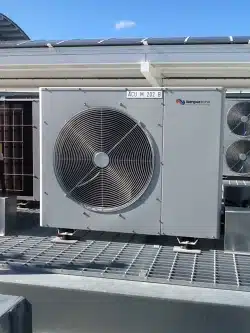
Refrigerated air conditioning outdoor unit
Pros:
- Can both heat and cool the property (with exception of some cooling only units)
- Filters the air reducing pollen, dust and dirt
- Removes moisture from the air on cooling
- Cools even when the weather is humid
- Can condition 1 or many rooms if required
Cons:
- Costs more to install
- Energy use is higher increasing operating costs
Requires regular filter cleans to ensure operation
Types of Reverse Cycle air conditioning units
Ducted units
Ducted indoor units are installed within the ceiling space. This allows ducting to be connected to the unit which can supply air to multiple rooms at once. Ducted units usually have zones. Zones are connected to switches on the wall that can turn airflow on/off to specific rooms.
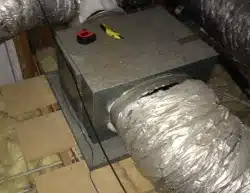
Ducted reverse cycle indoor unit
Hi-Wall units
Hi-wall units are used to condition 1 room but can overflow into adjoining rooms to some extent. The names comes from the location of the indoor unit which is generally installed high on a wall within a room.
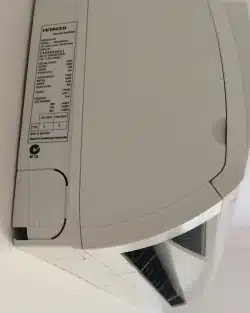
Hi Wall air conditioning indoor unit
RAC units
Also known as ‘Room Air Conditioners’ or ‘Box Units’. These units are all in one as both the indoor and outdoor sections are boxed together. RAC units are installed into a wall or a window which means they are quite noisy during operation.
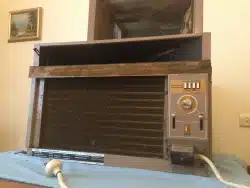
Room Air Conditioner unit (out of the wall)
Ceiling Cassette units
Ceiling Cassette units are not often used in domestic property applications. These units are installed into the ceiling and generally blow in 4 different directions. These units generally only condition the room they are installed in but the conditioned air can flow through to adjacent rooms to some extent.
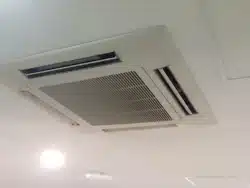
Ceiling Cassette air conditioner indoor unit
Package units
Package units are generally only used in commercial applications. The package unit has the indoor and outdoor unit in one box and is generally mounted on the roof. Ducting can be connected to a package unit which can condition multiple rooms at once.
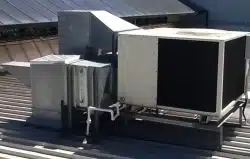
Package air conditioner unit
Evaporative air conditioning systems
Evaporative air conditioning units are cooling only. These units are sometimes paired up with gas heaters to allow heating and cooling. Some controllers state ‘heating’ but can only heat IF a heater has been installed. Evaporative units are efficient when the humidity is low but quickly become inefficient as humidity rises. Most evaporative units are installed on the roof and ducted to each room.
Evaporative units are all in one and consist of a fan motor and a water pump. More sophisticated evaporative units have automatic cleaning valves but they still require regular TLC.
Evaporative units use 100% fresh air to cool a home. At least 1 door or 2 windows need to be open for the unit to work effectively. To prolong life and reliability, evaporative units should be cleaned and switched off for Winter and serviced prior to Summer to ensure correct operation.
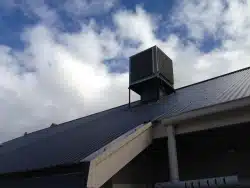
Evaporative air conditioner unit
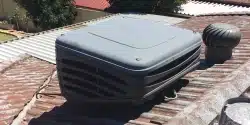
Contour type evaporative unit
Pros:
- Runs on 100% fresh air so doors and windows can be left open
- Cheaper to install and repair
- Cools well when the weather is hot and dry
- Can be ducted into multiple rooms
Cons:
- Cannot heat (unless paired with another form of heating)
- Will not cool well when weather is humid
- Requires cleaning on a regular basis, generally twice a year
Not sure what type of air conditioning unit the property has?
Looking for a brand name on the air conditioning unit will help determine what air conditioning system is installed in a property. Although some brand manufacture both evaporative AND reverse cycle units, the guide below is a good rule of thumb for some common brands out there.
Reverse Cycle units
- Temperzone
- Hitachi
- Mitsubishi Electric
- Daikin
- Samsung
- Panasonic
- Fujitsu
- Kelvinator
- Midea
- Derby
- Actron
- TCL
- Carrier
- Frigopol
- Airwell
- L.G.
- Mitsubishi Heavy Industries
- Email Air
Evaporative units
- Breezair
- Coolair
- Braemar
- Bonair
- Celaire
Need more help?
Adelaide air conditioning repairs, diagnostics and service is T&K Airpower’s specialty. If you have an issue with an air conditioning system at a rental property that you manage feel free to give us a call. Have a question about an existing air conditioning problem? Our friendly office team will be more than happy to help, even if you are not a current customer! Stay tuned for more Tech Talk blog posts as we delve deeper into these brands and more.